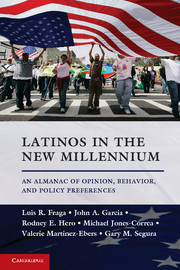Book contents
- Frontmatter
- Contents
- Acknowledgments
- 1 Latinos in the New Millennium
- 2 A Demographic Profile of Latinos in the United States
- 3 Core Values
- 4 Latino Identities
- 5 Latino Transnationalism
- 6 Intergroup Relations
- 7 Civic Engagement
- 8 Latino Media and Technology Usage
- 9 Voter Registration, Turnout, and Choice
- 10 Evolving Patterns and Preferences in Latino Partisanship
- 11 Latinos and Gender Role Attitudes
- 12 Latino Issues and Policy Preferences
- 13 Hope and Reality in Latino Educational Attainment
- 14 Latinos and the Future of American Politics
- Index
- References
10 - Evolving Patterns and Preferences in Latino Partisanship
Published online by Cambridge University Press: 05 June 2012
- Frontmatter
- Contents
- Acknowledgments
- 1 Latinos in the New Millennium
- 2 A Demographic Profile of Latinos in the United States
- 3 Core Values
- 4 Latino Identities
- 5 Latino Transnationalism
- 6 Intergroup Relations
- 7 Civic Engagement
- 8 Latino Media and Technology Usage
- 9 Voter Registration, Turnout, and Choice
- 10 Evolving Patterns and Preferences in Latino Partisanship
- 11 Latinos and Gender Role Attitudes
- 12 Latino Issues and Policy Preferences
- 13 Hope and Reality in Latino Educational Attainment
- 14 Latinos and the Future of American Politics
- Index
- References
Summary
Among the areas in which there has been much speculation about the growth and especially increased political participation of Latinos is their patterns of partisan identification, registration, and voting. It is well accepted that current Latino party identification favors Democrats, with the consistent exception of those Latinos of Cuban origin (DeSipio 1996; de la Garza, DeSipio, Garcia, Garcia, and Falcon 1992). However, significant speculation exists as to how stable this Democratic advantage is, how deeply these patterns hold, what the value foundations are of Latino partisan preferences, and whether the growing size and diversity of the Latino electorate present new opportunities and challenges for political parties to garner significant Latino voter support (Fraga and Ramírez 2003–2004; Fraga and Leal 2004).
We examine several aspects of Latino partisanship in this chapter, beginning with a summary of social science research regarding Latino partisanship. We then break down partisan identification by generation and citizenship, national origin, income, and education. This is followed by a discussion of the patterns of reported party registration by the same categories. We then provide data on important correlates of partisan identification, including recent changes in attitudes toward parties, ideology, coethnic candidates, and political knowledge. The chapter concludes with a consideration of what we learn about patterns of Latino partisanship from the LNS.
Information
- Type
- Chapter
- Information
- Latinos in the New MillenniumAn Almanac of Opinion, Behavior, and Policy Preferences, pp. 277 - 318Publisher: Cambridge University PressPrint publication year: 2011
